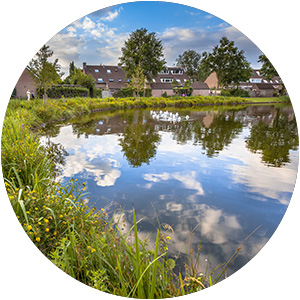 Almost 13 years to the day after gaining royal assent, Schedule 3 of The Flood and Water Management Act is scheduled for implementation, offering a clearer way forward for sustainable drainage measures in England.
Almost 13 years to the day after gaining royal assent, Schedule 3 of The Flood and Water Management Act is scheduled for implementation, offering a clearer way forward for sustainable drainage measures in England.
As of 10 January 2023 the Government accepted in full the recommendations of ‘The review for implementation of Schedule 3 to The Flood and Water Management Act 2010’.
The review identified the benefits and impacts of making sustainable drainage systems (SuDS) mandatory. It specified that Schedule 3 should be implemented in England by 2024.
To begin at the beginning
Schedule 3 to The Flood and Water Management Act was developed to give clear nationwide guidance on the design, construction and maintenance of SuDS, streamlining the approval process and making SuDS standardised and mandatory.
Schedule 3 will introduce:
- A SuDS Approval Body (SAB) set up specifically to deal with SuDS applications.
- An amended Section 106 of the Water Industry Act 1991, requiring SAB approval before connecting surface water to the public sewer. Currently any scheme with planning permission can connect to a public asset for surface water discharge.
- Mandatory SAB adoption and maintenance of approved SuDS that serve more than one property or that have an area over 100m2. Currently the maintenance of developments typically falls under the responsibility of private maintenance companies (PMCs).
- Engineers designing SuDS at project inception stage instead of as an afterthought.
According to the Chartered Institution of Water and Environmental Management (CIWEM), widespread SuDS implementation is “essential to addressing growing surface water food risk, tackling sewage pollution problems and is complementary to Biodiversity Net Gain and nutrient neutrality”.
Before Schedule 3 is implemented what parameters are there in England?
Currently there is a patchwork of several pieces of legal framework and guidance encouraging sustainable drainage.
- The Design and Construction Guidance (DCG) developed by Water UK (a body representing the UK water industry), came into force in April 2020, replacing the previous Sewers for Adoption standards. The DCG widened the range of drainage assets that can be adopted by water companies, but only for SuDS classified as sewerage features. Notable exceptions are localised SuDS features that do not convey water in a channel, such as green roofs and filter strips. These are encouraged by highlighting the benefits of taking a holistic approach to the design of SuDS, but responsibilities for maintenance remain unclear at times.
- The National Planning Policy Framework was revised in July 2021. This applies to England and states that all major developments (over 10 dwellings or equivalent non-residential development) should ensure that SuDS are in place, unless deemed to be inappropriate.
- The Town and Country Planning (Development Management Procedure (England) Order 2015. This made the Lead Local Flood Authority (LLFA) statutory consultees on all planning applications for major developments. The LLFA are required to comment on planning applications in respect to surface water drainage, which means they have more power to insist on appropriate use of SuDS drainage design.
How does England measure up to Wales?
The patchwork has never produced the same speed of roll-out or success seen across the border in Wales.
Issues with the SuDS implementation policies in England include:
- As a document for water companies, the Design and Construction Guidance covers a reduced scope of adoptable SuDS features, making it harder to take a holistic view. Responsibilities for maintenance can also be unclear.
- The National Planning Policy Framework and the Town and Country Planning Act only applies to properties greater than 10 dwellings, reducing the number of properties that require SuDS. In Wales SuDS apply to any development over one dwelling or over 100m2.
The last word
This is not the end of the road. A lot of work will be needed to develop standards and guidance, as well as the training and recruitment required for LLFA SAB approval teams.
With Wales as a case study though, it does seem that at last England is on course to implement widespread sustainable drainage measures. A move that will manage flood risk, provide better spaces for communities and improve the biodiversity of developments.